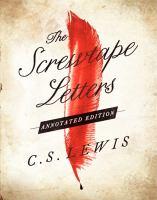
The Screwtape Letters by C.S. Lewis is a novel told in correspondence. Specifically, letters back and forth between a demon called Screwtape and his nephew Wormwood. These demons write to one another about all sorts of things, as families do, but mainly the humans. In this book, humans are the occupation of demons. Keeping them distracted, discontent, and leading them to misery is a merit of any accomplished demon. Readers will enjoy Wormwood's questions of "why must we do this?" or "is there a better way?" as he struggles with his mission to lead humans astray. Screwtape and Wormwood discuss many relevant issues of our own time, and the subject of spiritual warfare is present throughout. The Screwtape Letters is highly recommended for fans of Lewis as an introduction to more serious work or works on theology.
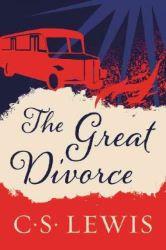
The Great Divorce by C.S. Lewis is a metaphysical novel following a bus tour through the afterlife. Strangers embark on wild journey through Heaven, Hell, and everything in between. As the story unfolds, characters realize every choice they make has a consequence, and their eternal destinies await them. Lewis speaks to universal experiences of grief, loneliness, and tragedy; his characters' stories are slowly told throughout the novel. Readers will enjoy the characters with varying backstories, explaining why they got on the bus tour. Follow humanity and hope unveiled in The Great Divorce. Next Stop: your bookshelf!
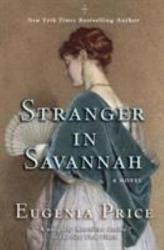
Stranger in Savannah is the final chapter of Eugenia Price's Savannah Quartet series and fills the niche of a Southern historical romance novel.
The novel follows the Browning, Mackay, and Stiles families and does an excellent job of creating drama related to the buildup of the American Civil War. While I do not often read romantic novels and the like, Stranger in Savannah feels very realistic thanks to its historic references. The setting of the Civil war and the air of political tension gave life to the drama, however, the underlying themes and Mark Browning as a character were all the more captivating. The book also drew me in with each characters' ambitions being intriguing and thoroughly fitting in major and minor plot points surrounding the setting and cast of the quartet. Overall, the novel was a fitting end to the series, and I would recommend not only this book but the entire Savannah Quartet to those interested in thematic historical romance.
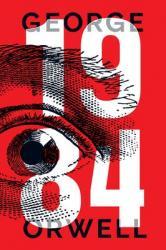
1984 by George Orwell is about a London where thought, speech, press is no longer free because it is all controlled by Big Brother and his Party. Every movement, gestor, spoke word is closely monitored by telescreens, hidden microphones, and cameras then reported to the Party. If you are found guilty of action or thought against the Party, you disappear. The Party controls everything. The protagonist, Winston Smith, a Party member who doubts the Party. The author does a fantastic job describing a place without freedom and the anxiety of living in it. Orwell makes the world come to life and makes you feel like it could happen. Personally, I feel like I could connect to the protagonist and the world. This book was quite unpredictable but easy to follow. All in all, It's a fantastic read, and I would recommend it with a 5 out of 5 stars.
Grade: 9
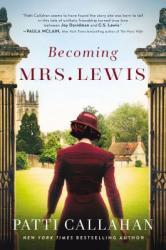
Becoming Mrs. Lewis, by Patti Callahan, is the fictionalized retelling of C.S. Lewis and Joy Davidman's unlikely love story. It is based around the correspondence between the two, their writings, and Joy's copious love sonnets. While C.S. Lewis is primarily known for his works of literature, his relationship with Joy was just as big--if not bigger--a part of his life as his work. The story is told entirely from Joy's perspective, with bits of correspondence sprinkled throughout her narration. Right out of the gate, Joy has an epiphany one night while living in a house in upstate New York with an abusive husband and two small sons. This holy experience leads to Joy's conversion to Christianity; then, searching for answers about faith, she comes into contact with the renowned author C.S. Lewis and they begin corresponding frequently. Eventually, Joy makes the choice to go to England because of health problems and her husband's abuse, and meets C.S. Lewis (whom she calls Jack) for the first time. The rest of the book is an agonizingly slow journey to their marriage, which happens under unfortunate circumstances at the very end.
I had awfully mixed feelings about this book. I was interested in learning more about the life of C.S. Lewis, but instead I received the sad, angsty story of Joy Davidman, and unfortunately, Joy Davidman--as portrayed by Callahan--is not a likeable character. She is impulsive in nearly all her actions, self-pitying and self-motivated (as exhibited by the fact that she leaves her two young sons in an abusive household while frolicking off to Europe), naive, obnoxious in much of her dialogue, excruciatingly desperate to be loved, and altogether irritating. However, I did like Jack's character, and overall there was some good character development. The plot itself was slow and redundant: dialogue dragged and nearly every conversation felt the same to me; I often found myself bored. It seemed like Callahan was running the plot in circles without ever achieving a climax. Also, as the story took place over several years in real life, Callahan was forced to glaze over several months at a time, never really going in depth about what took place in between Joy and Jack's meetings. As for the writing style itself--nothing to compliment. Callahan's syntax was unengaging and at times poorly executed, the story lacked imagery, and the use of British slang seemed forced, coming from an American author. Over the course of the book, Joy's feelings for Jack develop more quickly than his for her, and I couldn't help feeling disturbed by her physical attraction to a man 17 years older than her. Callahan should've backed off on Joy's excessive, out-of-the-blue thoughts of physical desire--they were disturbing and took away from Jack and Joy's friendship.
I believe the love story of C.S. Lewis and Joy Davidman would've been best left alone. While Callahan's novel is historically accurate, the fictionalization of intimate details and dialogue that belonged to the real Joy and Jack in their time did not sit well with me. I appreciated Callahan's inclusion of literary history--especially learning about Jack's life and how
it influenced his writing--and the last fifty pages of the book redeemed itself slightly, as the characters' growth was revealed and some important life lessons shone through. Occasionally I was immersed in the story and
rooting for Joy, but the mundane, repetitive, boring moments overshadowed those, and Callahan's Joy was not the female character I'd hoped she would be. I wouldn't call this book a romance, because it's simply desperation on
one side and friendzoning on the other until a dire situation wakes up the latter party to reality. Becoming Mrs. Lewis did not do it for me, and I don't recommend it unless you immensely enjoy poorly-written, many-liberties-taken fictionalized accounts of famous historical figures' lives. I believe Joy Davidman and C.S. Lewis were probably wonderful individuals in reality, and I wish Callahan had done them justice.
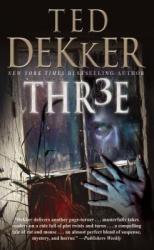
Thr3e by Ted Dekker (great title after reading the book) is one of the greatest murder mystery novels out there. The book begins with the main protagonist, or so it seems, Kevin Parson. He receives a phone call from a psychopath in Killer named Slater saying that he has three minutes to confess his sin to the world or else his car will blow up. This is just one of the many events that take Kevin, Samantha, his greatest friend, and Jennifer, an FBI agent, through a world of mystery and motives. The twists and turns are the main attraction of this novel, as the reader won't expect what comes next. Character backstories also play a gigantic role in this novel, and all of them are well crafted to fit the plot. Anyways, I would recommend it to anyone willing to take the time to read a book.
Grade: 8
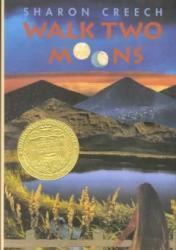
On her way to Ohio to find her mother Salamanca, and her grandparents journey across the country to get there. On the way Sal tells the story of Phoebe Winterbottom a peculiar girl she met. I rate this a 5/5. The hidden messages really gives this book depth. Such as the irrationality of Phoebe, but also how Sal can understand her friend. They don't have a perfect relationship, which makes it very realistic. I recommend you read this, it's filled with suspense, action, and drama you won't be able to put it down.
Reviewer Grade: 7
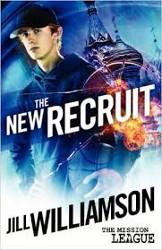
This book caught my eye because of the title. Just the sound of "The New Recruit" makes the book sound like it is full of adventure...and it is!
The story opens with the introduction of the main character, a prospective freshman varsity basketball player named Spencer Garmond. He is living with his grandmother in Pilot Point, California, and has been living with her ever since his dad left the family and his mother died. Spencer's grandmother threatens to pull him out of his Christian school and put him in military school. Fortunately for Spencer, a mysterious man named Mr. Stopplecamp wishes to recruit Spencer for a Bible club called Mission League. Forced to chose between military school and the league, Spencer signs up with the Mission League, but soon realizes the true purpose of the league (which is not to be Bible geeks). This book is filled with adventure, action, spying on Russia, and other "fun stuff." A must read for anyone who is looking for a James Bond type story with lots of humor and, maybe, a bit of romance.
Reviewer Grade: 9
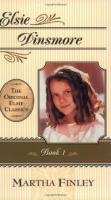
The Elsie Dinsmore Series was published between 1868 and 1904. In the first book of 28 novels, we find Elsie, a half orphaned, love-starved child, struggling to obey her Heavenly Father, while missing her own dad terribly. Elsie’s mother died when she was only a few weeks old, and, since her father was traveling, she lived with a guardian until he also passed away. Elsie was only two. She was then taken under the wings of her grandparents (her father’s parents) who don’t seem to care a smidgen for their granddaughter. At the start of the book, we find Elsie, now eight, living in the cold shadow of her grandparents. For some reason, her young aunts and uncles also despise her. One of her only comforts is when her nurse “Aunt Chloe” teaches Elsie to love even when others do not love in return. But the most important thing Aunt Chloe has taught her is that God loves her. Elsie’s other comfort is her well-loved Bible. When Elsie’s earthly father returns from his long travels, his cruel treatment of his daughter leaves Elsie feeling more sorrow and need for God’s everlasting love than ever before. Read this adventure to find out the rest of the touching story. I think this book has a good Christian message as the reader follows Elsie through a number of faith-building trials in a desperate attempt to gain her heartless father’s longed for love. This is a book I recommend for those searching for a strong spiritual message and a faith-based challenge to love even the unlovable.
Reviewer Grade: 8